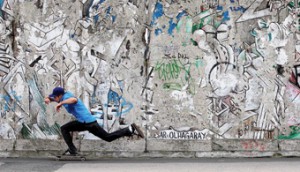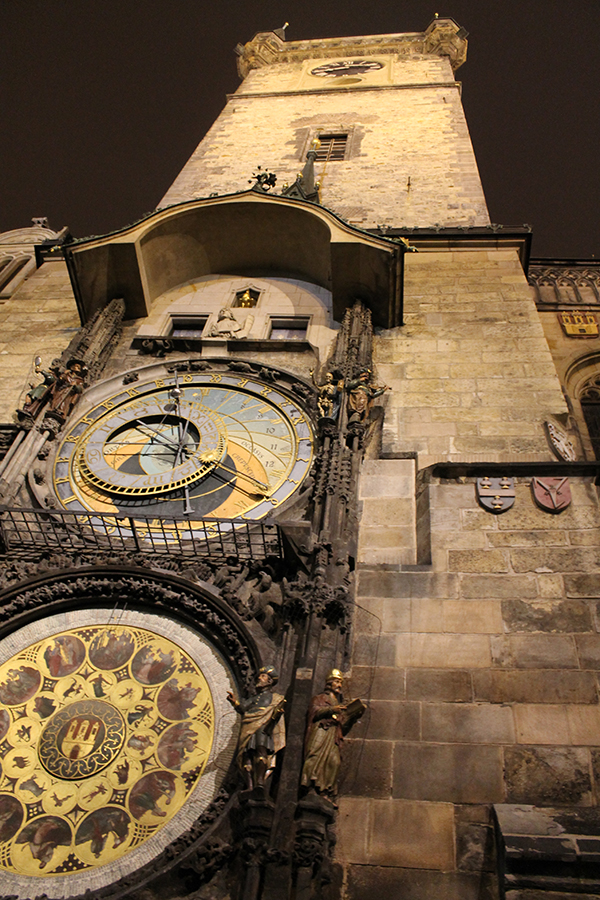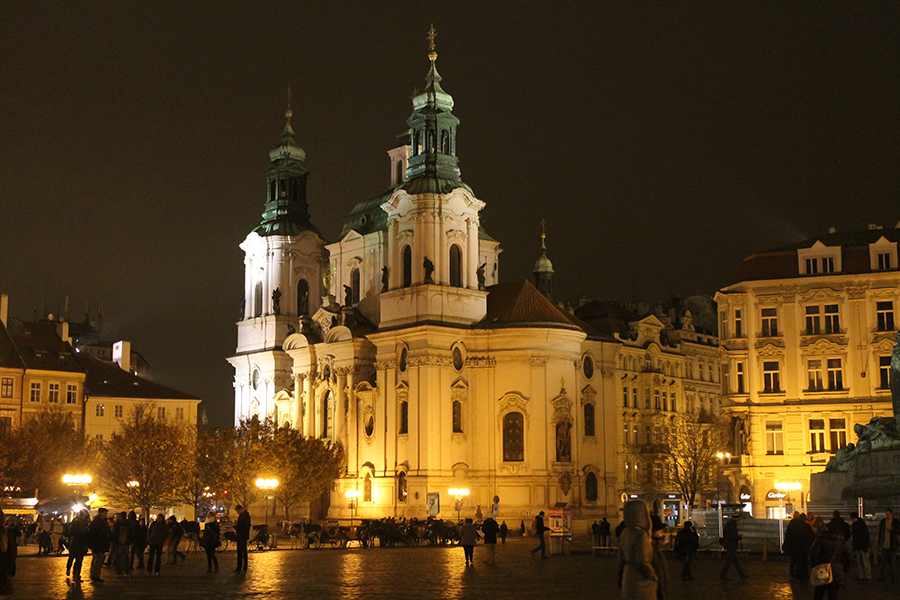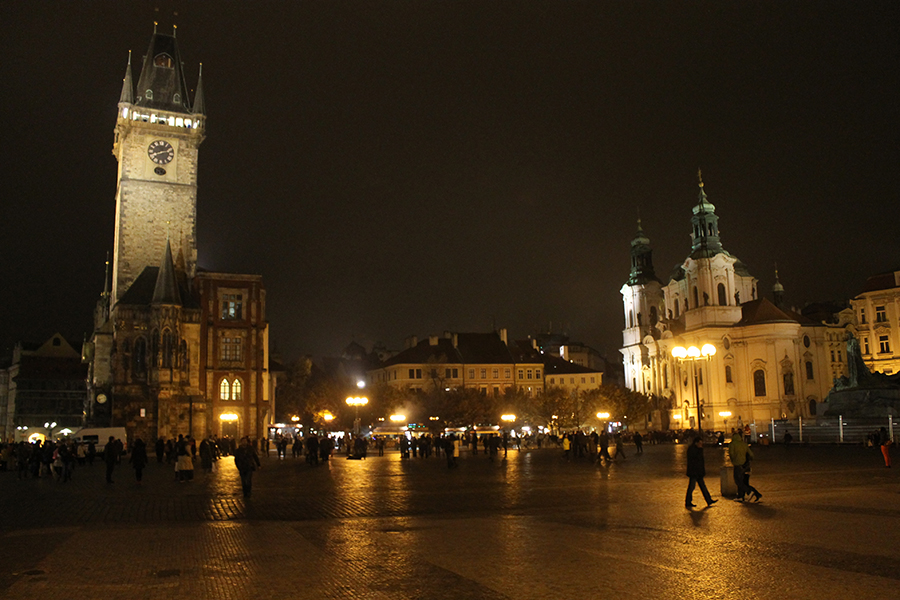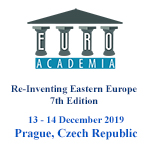Anglo American University
Conference Room: Auditorium (2.07)
Letenska 5, 118 00
Prague, Czech RepublicConference Agenda
- December 13, 2019
- 09:00 - 09:30Participants’ Registration (Reception Desk, Conference Room Foyer)
- 09:30 - 10:30Welcome and Opening Remarks / Opening Workshop: Re-Inventing Eastern Europe 30 Years from the Revolutions in Central and Eastern Europe
- 10:30 - 11:00Coffee Break and Snacks
- 11:00 - 13:00Panel 1 – Space and Imaginary Geographies of Central and Eastern Europe: From Maps to Mental Mappings
- 13:00 - 14:30Lunch – Restaurant
- 14:30 - 16:30Panel 2 – Persisting Imaginary Dichotomies of Eastern/Western Europe with Its Axiological Categories and Perceptions: Visual and Narrative Dimensions
- 16:30 - 17:00Coffee Break and Snacks
- 17:00 - 19:00Panel 3 – Art as Cultural Diplomacy: (Re)Constructing Notions of Eastern and Western Europe
- 19:00 - 19:30Closing Discussions & Remarks: End of Conference Day
- 19:30 - 20:30Optional Social Dinner Out in Prague
- December 14, 2019
- 08:30 - 10:30Panel 4 – Readings of the Past: On Memory, Remembrance and Memorialization in Central and Eastern Europe
- 10:30 - 11:00Coffee Break and Snacks
- 11:00 - 13:00Panel 5 – Identity and the City: Visual Urban Transformations: Transition and Change in Urban Image Construction in Central and Eastern Europe
- 13:00 - 14:30Lunch – Restaurant
- 14:30 - 16:30Panel 6 – Central East European Economies: Trade, Development and Structural Change in the Region
- 16:30 - 17:00Coffee Break and Snacks
- 17:00 - 19:00Panel 7 – The Process of Europeanization in CEE: Assessing the Political Dynamics of an Invented Region
- 19:00 - 19:30Closing Session” Concluding Discussion & Remarks
- 19:30 - 20:30Optional Social Dinner Out in Prague
- December 13, 2019
Re-Inventing Eastern Europe (7th Edition)

- Conference Description
- Participant’s Profile
- Registration and Fee
- Social Activities and Publication
- Important Dates
- Venue and Directions
- Conference Program
- Panel 1
- Panel 2
- Panel 3
- Panel 4
- Panel 5
- Panel 6
- Panel 7
The 7th Euroacademia International Conference
Re-Inventing Eastern Europe
30 Years from the Revolutions in Central and Eastern Europe
13 – 14 December 2019
Anglo American University, Prague, Czech Republic
School of International Relations and Diplomacy
Conference Description
Not a very long time ago, a British lady was considered bigoted by Gordon Brown upon asking ‘all these Eastern Europeans what are coming in, where are they flocking from?’(1). The zoological word is not a novelty in the cultural invention of Eastern Europe. Maybe, despite her concern with the dangers of immigration for Britain, the lady was right in showing that such a question still awaits for answers in Europe. The ironic aspect however is that a first answer to such a question would point to the fact that the Eastern Europeans come from the Western European imaginary. As Iver Neumann puts it, ‘regions are invented by political actors as a political program, they are not simply waiting to be discovered’(2). And, as Larry Wolff skillfully showed, Eastern Europe is an invention emanated initially from the intellectual agendas of the elites of Enlightenment that later found its peak of imaginary separation during the Cold War(3).
The Economist, explicitly considered Eastern Europe to be wrongly labelled and elaborated that ‘it was never a very coherent idea and it is becoming a damaging one’(4). The EU enlargement however was expected to make the East/West division obsolete under the veil of a prophesied convergence. That would have finally proven the non-ontological, historically contingent and unhappy nature of the division of Europe and remind Europeans of the wider size of their continent and the inclusive and empowering nature of their values. Yet, more than 20 years after the revolutions in the Central and Eastern European countries, Leon Mark, while arguing that the category of Eastern Europe is outdated and misleading, bitterly asked a still relevant question today: ‘will Europe ever give up the need to have an East?’(5)
Eastern Europe was invented as a region and continues to be re-invented from outside and inside. From outside its invention was connected with alterity making processes, and, from inside the region, the Central and Eastern European countries got into a civilizational beauty contest themselves in search of drawing the most western profile: what’s Central Europe, what’s more Eastern, what’s more Ottoman, Balkan, Byzantine, who is the actual kidnapped kid of the West, who can build better credentials by pushing the Easterness to the next border. A wide variety of scholars addressed the western narratives of making the Eastern European ‘other’ as an outcome of cultural politics of enlightenment, as an effect of EU’s need to delineate its borders, as an outcome of its views on security, or as a type of ‘orientalism’ or post-colonialism. Most of these types of approaches are still useful in analyzing the persistence of a East-West slope 30 years after the revolutions in Central and Eastern Europe. The region is understood now under a process of convergence, socialization and Europeanization that will have as outcomes an ‘ever closer union’ where the East and the West will fade away as categories. Yet the reality is far from such an outcome while the persistence of categories of alterity making towards the ‘East’ is not always dismantled simultaneously with the increased diversity of political patterns emerging in the region. The discourses on core/non-core, new Europe/old Europe, pioneers/followers, teachers/pupils, center/periphery, cosmos/chaos are often maintaining significant ground within the arena of European identity narratives often yet not exclusively voiced by the EU.
The 7th Euroacademia International Conference ‘Re-Inventing Eastern Europe’ aims rather than asserting to make a case and to provide alternative views on the dynamics, persistence and manifestations of the practices of alterity making that take place in Europe and broadly in the mental mappings of the world. It offers an opportunity for scholars, activists and practitioners to locate, discuss and debate the multiple dimensions in which specific narratives of alterity making towards Eastern Europe preserve their salience today in re-furbished and re-fashioned manners. The conference aims to look at the processes of alterity making as puzzles and to address the persistence of the East-West dichotomies simultaneously to assessing the diversity and change within the CEE region 30 years after the fall of the Iron Curtain.
(1) See the whole dialogue between Gillian Duffy and Gordon Brown on BBC News online at http://news.bbc.co.uk/2/hi/uk_news/politics/election_2010/8649448.stm
(2) Neumann, Iver. 2001. Regionalism and Democratisation. In Jan Zielonka and Alex Pravda (eds.), Democratic Consolidation in Eastern Europe, Vol 2 International Dimensions. Oxford and New York: Oxford University Press, pp. 58 – 75, p. 71.
(3) Wolff, Larry. 1994. Inventing Eastern Europe. The Map of Civilization on the Mind of the Enlightenment. Stanford: Stanford University Press.
(4) The Economist, January 7th 2010, http://www.economist.com/node/15213108
(5) Marc, Leon. 2009. What’s So Eastern about Eastern Europe? Twenty Years After the Fall of The Berlin Wall. Trowbridge: Oldcastle Books, p.161.
Participant’s Profile
The conference is addressed to academics, researchers and professionals with a particular interest in Central and Eastern Europe, Europe related and European Union topics from all parts of the world. As the nature of the conference is intended to be multidisciplinary in nature, different academic backgrounds are equally welcomed. Cultural approaches, political studies, critical studies, out of mainstream approaches and artistic/literary contributions to the better understanding of Central and Eastern Europe in its past present and future dimensions are all equally welcomed. Euroacademia favors alternative and innovative thinking proposals and non-mainstream methodologies.
Post-graduate students, doctoral candidates and young researchers are welcomed to submit an abstract. Representatives of INGOs, NGOs, Think Tanks and activists willing to present their work with impact on or influenced by specific understandings of Central and Eastern Europe are welcomed as well to submit the abstract of their contribution.
Registration and Fee
Registration Process is Now Closed
The Participation Fee Includes:
- the conference registration and full access to proceedings
- participant’s package with all the materials for the conference
- official invitation
- eligibility for inclusion in the publications resulting from the conference
- access to Euroacademia discussion group and newsletters
- coffee brakes with refreshing drinks for all the duration of the conference
- a 3 course lunch on 13th of December 2019 at a typical Czech cuisine restaurant
- a 3 course lunch on 14th of December 2019 at a typical Czech cuisine restaurant
- certificate of attendance
- access to optional social program
Unfortunately, Euroacademia has no available funds for any financial assistance in arranging transport and accommodation to/in Prague. Participants are responsible for securing funding to cover transportation and accommodation costs during the whole period of the conference. Official invitation letters can be sent by Euroacademia to the financing institution to confirm the selection and participation in the conference upon request.
Social Activities and Publication
A specific spot in the conference program will be dedicated to social networking and therefore all the participants interested in setting or developing further cooperation agendas and prospects with other participants will have time to present and/or promote their project and express calls for cooperation.
A specific setting (Social Corner) for promotional materials connected with the topic of the conference will be reserved for the use of the participants. Books authored or edited by the participants can be exhibited and promoted during the whole period of the conference and can also be presented within the conference package based on prior arrangements.
Photos and videos will be taken during the conference and the organizers will consider through the participation of selected presenters or members of the audience that the agreement for being photographed or filmed during the event was granted through registration to the event. Please notify the organizers in written form prior to the the event if you are a confirmed participant and would prefer otherwise.
An optional dinner and a social event will be organized for the second evening of the conference in a typical Czech cuisine restaurant as optional program for the willing participants. The social dinner will be held based on participant’s confirmation and covered by participants individually on spot based on their order.
Publication:
Selected papers will be published in an electronic volume with ISBN after the confirmation of the authors and a double peer-review process based on an agreed publication schedule. All the papers selected for publication should be original and must have not been priory published elsewhere. All participants to the conference will receive a copy of the volume.
Specific selected papers will be also published in CEJISS (Central European Journal of International & Security Studies)
About CEJISS
Formally launched in January 2007, CEJISS is designed as a double-destination scholarly bridge. The first bridge was constructed with Central Europe (Czech Republic, Hungary, Poland and Slovakia) in mind, focusing on increasing the audience for Central European scholars. In this regard, CEJISS is making a substantial impact as each issue attracts attention in some 45,000 people in nearly 160 countries. However, CEJISS is not Central European centric and invites scholars from around the world to contribute. This has meant that just as Central European scholars now have an easier time gaining a footing outside of the region, so international scholars also have an easier time getting in and making an impact here. With a mere two decades separating our times from the ‘darker’ Cold War years, CEJISS aims to contribute English language perspectives to the peoples of Central Europe and give the latter the amplification their research deserves.
| Important Dates | |
|---|---|
| 15th of October 2019 | Deadline for Submitting Panel Proposals |
| 1st of November 2019 | Deadline for Submitting Paper Proposals |
| 4th of November 2019 | Latest notification of acceptance |
| 7th of November 2019 | Sending the Registration Form |
| 11th of November 2019 | Payment of the conference fee |
| 28th of November 2019 | Sending the draft paper to be uploaded on the conference website |
| 29th of November 2019 | Publication of the conference program and uploading the draft papers on the website |
| 13th of December 2019 | The conference commences at 9.00 am |
Venue and Directions
The conference will take place in the beautiful premises of the Anglo-American University, centrally located in the heart of Prague, few steps away from the fabulous XIVth century Charles Bridge and within a walking distance from the main historical landmarks of Prague and in the proximity of the Franz Kafka Museum. Letenska 5 Prague is a wonderful European city with a very rich history and a vivid passionate intellectual life; a place full of various and inspiring cultural events, sightseeing opportunities, great food, exquisite architecture and of course the city that brings easily to your mind Jan Hus, Franz Kafka, Jan Palach, the Prague Spring, and Milan Kundera. After all these, the unique atmosphere gives anyone a chance for personal memories and reveries. Prague is a city of beautiful moments!
Anglo American University, Prague
118 00, Prague, Czech Republic
Anglo-American University is the oldest private institution of higher education in the Czech Republic and provides a personalized and distinctive university education in the English language. Utilizing the best from American and British academic traditions, Anglo-American University educates future leaders and global citizens in a multicultural setting of students and faculty from over 60 different countries.

With its main campus situated right under the Prague Castle in the historic district of Malá Strana, AAU boasts one of the most attractive locations of any Central European university. The palace offers 16 modern fully-equipped classrooms, a computer lab and a visual arts studio along with a cafeteria, spacious courtyard and modern student lounges for studying and socializing. Located next to the palace and directly accessible from the campus is the beautiful park Vojan Gardens.

See full details for arriving at the conference location:
HERE
Conference participants are fully responsible for arranging their accommodation and travel to Prague.
Conference Program
The Conference Agenda is available in the right sidebar of this page.
The extensive conference program with abstracts and available draft papers is accessible below by clicking on the panel number tabs and links of individual presentations.
Space and Imaginary Geographies of Central and Eastern Europe: From Maps to Mental Mappings in Identity Making Narratives
- Looking towards East on 16th Century MapsThe geographic encyclopedias and atlases of the 16th century are giving us some of the first systematic representations of the borders of Europe. We will explore some of the most influential geographic publications of the 16th century that appeared in western and central Europe. Following a classical model of Ptolemy, these first Atlases of the world always start from west so that the discussion of Eastern Europe comes towards the end of the book. And the descriptions given to the people occupying these territories are not always flattering.Ioana Zamfir, University of Bucharest, Romania
- Clashing Geographical Imaginaries: The Strange Co-Presence of Christian Bulwark and Eurasianism in HungaryA few years ago, the far right explicitly announced a Dugin-inspired Hungarian Eurasianism as its foreign policy program. The Hungarian government invoked Ottoman invasion to justify keeping refugees out in 2015 and has been using a harsh rhetoric and policy against Muslim immigrants ever since.The paper’s preliminary conclusion is that these two orientations can today co-exist for two reasons. As elsewhere, Christian traditions and symbols in Hungary have maintained some pre-Christian (in this case Turanian) elements in order to remain popular among the wider masses. Secondly, and more important for today, the image of a liberal/multicultural West serve as a shared enemy for Hungarian Eurasianism and (political) Christianity alike.Péter Balogh, Department of Social and Economic Geography, Eötvös Loránd University, Budapest, Hungary
- Nesting Orientalisms: The Case of Hungary, Its Imaginary Occidentalisation Process and InconsistenciesThrough the process of mapping its location and construction of occidental identity, Hungary defines itself as a part of central Europe. But what are the legitimated reasons of Hungary to define itself as central European instead of eastern Europe? What are the possible reasons to reject Hungary’s central European self-definition? Moreover, under the shadow of the discussion on central Europe vs. eastern Europe, to what extent does the rise of authoritarianism block ongoing occidentalisation process of Hungary? In this research, I will answer these questions by analyzing modern political history of Hungary.Cemre Aydoğan, University of Rome 'La Sapienza', Italy
- Mental Mapping of the Western Europe and Its Effects on Public Diplomacy Making: Comparison of Polish and Turkish Public Diplomacy Making Regarding the European UnionMy prospective research asks whether the mental mapping of the Western Europe has an impact on public diplomacy making as research question. To answer this question, two different cases of Polish and Turkish public diplomacy making regarding the European Union will be compared with the help of method of agreement. Although two countries differ in terms of European Union membership, territoriality and culture, both tries to show their “Europeanness” through public diplomacy. In this regard, my prospective research aims to research effects of the mental mapping of Western Europe on these similar outcomes.Hilal Atmaca, University of Cologne, Germany
Persisting Imaginary Dichotomies of Eastern/Western Europe with Its Axiological Categories and Perceptions: Visual and Narrative Dimensions
- Home Is A Foreign Country: East German Alterity in Post-1990 FilmThe Eastern European alterity at issue is thereby doubly informed. On the one hand, it constructs an Orientalist Other within the bounds of the continent. My paper contends that while the Orientalist Other overshadows the Eastern European alterity based on a non-capitalist experience, it is ultimately the latter which makes the East an increasingly popular subject. After all, the crisis of the neoliberalist project does not only affect the East: it is a global phenomenon that already commands the attention of a global audience and will—ultimately, eventually—demand a global perspective.Evelyn Preuss, Yale University, USA
- Provinciality in the Construction of the Eastern European Self-Identity in Latvian MediaThe paper focuses on provinciality in the construction of the identity and self-identity of Eastern Europe. By provincialism is understood the rational and emotional attitude towards Eastern Europe as the periphery of the European metropolis. Provincial thinking and feelings are characterised by a hierarchical approach to the imagined construction of the centre and periphery.Provincial feelings have an ambivalent character. On the one hand, affiliation to Eastern Europe is accompanied by a certain sense of inferiority, detachment and distance, resulting from a comparison with an increased value allocation for Western Europe, its society, art, way of life and values.Skaidrite Lasmane, Department of Communication, University of Latvia
- The Visual Language of Neo-Nationalism: Patriotic Performance and Fashion in the Post-Communist Central European, Eurasia and Baltic StatesMy assumption is that current development of the Post-Communist neo-nationalist patriotic fashion and performance resembles the 19th century patriotic national self-visualization. Similarly to the 19th century, it is based on imagination and emotions and the progress of nowadays media plays the same role in the visualization of nationalistic ideology which the development of periodicals, photographs and cinema played then. After the idea of nationalism collapsed following the decline of empires, successor states and the Communist bloc in the 20th century, the nowadays neo-nationalism starts to develop.Anna Novikov, The University of Greifswald, Germany
- Rethinking the East-West Dichotomy: Czech Travel Writing about Portugal, Where the Earth Ends and the Sea BeginsFocusing on the relationship between East European Czech culture and West European Portuguese culture as portrayed through Czech travel writing, this paper provides an alternative perspective to the traditional East-West dichotomy. I address ways that Czech travel writing has portrayed Portugal within the context of how this Western European Portuguese nation is seen from its East. From the standpoint of Czech nationalists, the Czech lands are the center while the Western European country of Portugal becomes the periphery, the symbolic end of the world where the earth ends, and the sea begins.Kamila Kinyon, University of Denver, USA
Art as Cultural Diplomacy: (Re)Constructing Notions of Eastern and Western Europe
- Thinking on Art as a Sustainable Instrument of Cultural DiplomacyThe notion of art as an effective instrument of cultural diplomacy is undervalued and not fully explored, even though cultural diplomacy has a long history and has surged over recent years. The focus of this paper is to discuss the role of the contemporary art space as an instrumental tool harnessing new approaches of cultural diplomacy that engender sustainable and advantageous international relations; this whilst embracing curatorial practices that align with notions of alterity to effectively broker collective interests, present European values, and ‘unity in diversity’.Ruth Bianco, Department of Visual Arts / Faculty for the Built Environment, University of Malta
- The Berlin Biennale – Curating Cultural Diplomacy in the Unified CityThis paper will explore the position the Biennale has taken of straddling the art world and being a representative of the state, questioning what political influence is possible within this. Using Forget Fear, the seventh Berlin Biennale held in the summer of 2012 curated by Artur Żmijewski, an artist known for his politically engaged and often highly controversial artwork, as the primary example through which to explore its arguably overdetermined political content. Looking beyond these arguments this research attempts to present a productive analysis of how the Biennale can work as both a diplomatic device in place-marketing the city and still provide a significant contribution to contemporary exhibition-making.Nicola Guy, University of Hull, Heritage Consortium, United Kingdom
- Can Art Save the World? How “Old” and “New” Europe Performed Cultural Diplomacy Events with Russia at the Time of War in Ukraine 2014-2015Cultural diplomacy is seen as a subnetwork of public diplomacy, framed both by foreign and cultural policy. The presentation, while focusing on the structures (nodes of cultural diplomacy network), goes back to neo-institutional approaches and to foreign policy analysis. The author asks the question which role was ascribed to the artists and cultural industry in the debates about the events. The answer to the latter comes from the analysis of government documents and reports, debates in parliaments, but also from the content analysis of media outlets, covering the events.Beata Ociepka, University of Wrocław, Poland
- The Political Background of a Failed Idea: Peter Ludwig Collection in BulgariaThe paper will discuss the political background of the rejection of Peter Ludwig’s donation and the Bulgarian authorities’s refusal to participate in the creation of a Peter Ludwig Collection of Contemporary Art in Bulgaria. The story sank into oblivion and was never made public or discussed afterward. In 2018 I had the chance to work with the archive owned both by Svetlin Roussev and the St. Cyril and St. Methodius International Foundation in Sofia. It allowed me to trace the history back to its main protagonists and decision-makers, and it revealed selection mechanisms, as well as other practices of cultural politics in a moment of harsh political changes.Galina Dekova, Sofia City Art Gallery / National Academy of Art, Bulgaria
Readings of the Past: On Memory, Remembrance and Memorialization in Central and Eastern Europe
- A Trauma of Committee of Union and Progress: Reconsidering the First Balkan War (1912 – 1913)As Ottoman Empire was collapsing many nations who had lived under Ottoman rule began to riot underway to establish their own independent states. Committee of Union and Progress (CUP), which was an opposed group founded to transform the monarchic Ottoman system into constitutional democracy, undertook the protector status of the state at these times. This study is twofold: Firstly it aims to reexamine the Balkan Wars regarding to CUP and its centralized policies. On the other hand, as a different perspective, this work focuses on emotional cues of CUP that are contains contradictory feelings, especially ‘love and hate’. Based on this, an inter-disciplinary approach of the Balkan wars history will be reevaluated by linking centralization policies of CUP and traumatic results of these moves.Hikmet Çağrı Yardımcı, Hasan Kalyoncu University, Gaziantep, Turkey
- Faith in Philosophy: Patočka and the Spiritual Foundation of EuropeJan Patočka is one of the prominent figures of both twentieth-century European philosophy and Czech political history. He was one of the last pupils of Edmund Husserl and Martin Heidegger, while at the same time he was one of the original signatories and main spokespersons for the Charter 77 human rights movement in Czechoslovakia. In addition to his influence on youth -one among them was Václav Havel, the first president of Czechia-, he extensively wrote on the concept of Europe. My intent in this study is to take some first steps towards elucidating Patočka’s conception of Europe in order to bring a comprehensive understanding on both his interpretation of Europe and its importance regarding theoretical background of Czech dissident movement known as Charter 77. Keywords: crisis, Charter 77, Europe, responsibility, sacrifice.Ahmet Kaan Ketboga, University of Cologne, Germany
- From War to Fragile Peace in Bosnia: The Quest for Statehood and National IdentityThe quest for statehood and national identity remains a hot pursuit in Bosnia two and a half decades after the official ending of the war (1992-1995). Centered on contested narratives pertaining to the causes of—and parties’ conduct in—the Bosnian War, as well as the redistribution of power and the re-organisation of the postwar polity, the quest for statehood and the national identity exposes interesting dynamics of alterity making both without and within the Bosnian polity. This paper unpacks these dynamics with particular reference to the effects of war violence on the constitution and contestation of Bosnia’s statehood and its fragile national identity. It shows that representations of war violence remain active in the efforts to construct, or contest, the Bosnian polity and its political community. Such representations particularly with reference to genocide are part of a broader struggle over issues of identity, authority, legitimacy and security.Klejda Mulaj, University of Exeter, United Kingdom
Identity and the City: Visual Urban Transformations: Transition and Change in Urban Image Construction in Central and Eastern Europe
- Postcolonial Europe? Eastern European Cities in Hungarian Expatriate LiteratureRelying on a postcolonial theoretical framework, East-Central Europe might be conceptualised as a “blind spot” of Westocentric conceptions of modernity as well as a peripheral region characterised both by an asymmetrical relationship with the West and the rise of conservative ideologies of the nation state. Relying on Sandra Ponzanesi’s recent work on the peripheries of postcolonial Europe (Postcolonial Transitions in Europe, 2017), my presentation will explore the urban memorialization of traumatic historical events in the region, primarily the Second World War, the 1956 Revolution in Hungary and the 1968 Prague Spring, in expatriate narratives such as Kristóf’s The Notebook (1986) Tibor Fischer’s Under the Frog (1992) and Bánk’s The Swimmer (2002).Ágnes Györke, Department of Literary and Cultural Studies, Károli Gáspár University, Budapest, Hungary
- Tivat’s Trajectory – From Arsenal to Porto MontenegroThis paper examines how and to what extent urban regeneration works in practice through the lens of Tivat’s regeneration. The paper enlightens Tivat’s economic and physical transformation from the town know as a base of the Naval-shipyard “Arsenal” to the nautical-touristic complex “Porto Montenegro”. In the modern history urban development of Tivat was related to the Naval-shipyard “Sava Kovacevic”, most often referred to by its old name “Arsenal”. Since its development in 1889, Arsenal became the main employer in town and shaped the town’s identity. The paper enlightens Tivat’s economic and physical transformation from the town know as a base of the Naval-shipyard “Arsenal” to the nautical-touristic complex “Porto Montenegro”. In the modern history urban development of Tivat was related to the Naval-shipyard “Sava Kovacevic”, most often referred to by its old name “Arsenal”. Since its development in 1889, Arsenal became the main employer in town and shaped the town’s identity.Ksenija Martinovic, Central European Initiative, Trieste, Italy
- Housing the New Identity: Images of a Good Life in the Post-Socialist CityIn this paper I’ll present the analysis of the new housing estates built after 2000s in Vilnius, capital of Lithuania, as the locus of the new urban identity in a post-socialist city. The image of a city in the temporally and spatially post-socialist site is constructed via the new urban structures. As an exemplary place to look for the cultural notions of what constitutes a good city and how to properly live in it in post-socialist circumstances, I explore the images of the city that are implicated in new housing projects, since housing, or even further – the idea of house and home, express social values: they incarnate general ideas about society and how to live in it. I address housing estates as narratives, first, as material narratives suggesting the way of proper living in the new conditions and second, symbolical narratives, stories suggested by the real estate developers about a good life in a post-socialist city. I claim, that the relation of the space in post-socialism to socialism is in fact twofold: it is a paradigm of breakage and continuity.Dalia Čiupailaitė-Višnevska, Vilnius University, Lithuania
Central East European Economies: Trade, Development and Structural Change in the Region
- Please Close the Gap! New Development Models of CEE Economies?This paper therefore aims to focus on the topic of ‘capability development’, by approaching it more holistically and investigating its current state in East Central Europe. It focuses on three central aspects of capability development, namely the import of capabilities by foreign actors, the endogenous development of capabilities within the region, and efforts to govern their improvement. The paper shows that capability development in ECE faces many challenges. Firstly, the import of capabilities is slowing down noticeably, as foreign actors are embracing the status quo. Secondly, endogenous capability development is still insufficient due to feedback loops between highly diverging individual capabilities and little interaction. Thirdly, efforts to govern the capability development have had limited success so far.Sebastian Kinder, Tübingen University, GermanyJan Peter Kosok, Department of Economic Geography, Tübingen University, Germany
- Economic Convergence in Central and Eastern EuropeThe economic convergence represents the main rationale of the EU integration process. Over the past decades the CEE economies have been confronted with several structural changes. In this paper we apply standard econometric tools and use the Eurostat database, in order to analyze the EU economic convergence process across CEE (Visegrad and Romania) during 2000-2018. According to our results these countries should address the structural problems (labor market, banking sector, R&D, infrastructure, in order to improve the regional integration and to increase the resilience of the region during the incidence of a crisis.Andrei Radulescu, Transylvania Bank and Romanian Academy, Bucharest, Romania
- Ukraine’s Economic Marathon for EU MembershipThe presentation will be devoted to the analysis of the economic transformation process of Ukraine in the context of the implementation of the Association Agreement between the European Union and Ukraine. Ukraine does not have a systemic strategy of economic transformation breaking the deadlock in terms of macroeconomic stability. Economic changes in Ukraine are reactive to changes taking place inside the state (in the conditions of the Russian-Ukrainian war) and in the international environment, especially in the EU. The article will contain both formal and practical dimensions of economic transformation.Marta Drabczuk, University of Maria Curie-Sklodowska in Lublin, Poland
- Approximation of the Legislation of Member States to EU Tax Policy: The Case Study of EstoniaThe aim of EU Tax Policy is the approximation and harmonization of Tax Systems of Member states to EU Tax directives. This process serves the economic integration of member states into the EU and the facilitation of trade relations. This paper discusses the long and difficult transition trajectory of Estonia (one of the EU Member States) from communist regime to independence that was followed by various reforms, including transition to market economy and fundamental transformation of Taxation system.Mariam Jikia, Georgian Technical University, Tbilisi, GeorgiaIrakli Gabisonia, Georgian Technical University, Tbilisi, Georgia
The Process of Europeanization in CEE: Assessing the Political Dynamics of an Invented Region
- The Conflict of American and Russian Influence on the Territory of the Former YugoslaviaThe territory of former Yugoslavia has historically been marked by a lasting conflict of civilizations and religions, to which nowadays the conflict of geopolitical interests of Russia and the USA, respectively, adds its share. With the fall of communist regimes in the 1990’s and the ensuing dismemberment of former Yugoslavia, new national states came into existence, destabilizing the whole region and ultimately leading into chaos which took the shape of the sanguinary Yugoslav Wars. This paper analyzes the momentary relationships and potential future developments concerning the American and Russian influence on the territory of former Yugoslavia. With respect to this, it poses several questions. What are the ways in which Russia attempts to keep its influence in the region? Who are the main actors in related struggles for political power? What are the principal instruments by which the USA and Russia, respectively, seek to promote their interests?Andrej Rendic, University in Zadar, Croatia
- On the Edge of ‘Europe’? A Polish Bridge Between East and West?The paper will consider the extent to which Poland’s geographical position on the edge of the Euro-Atlantic security community influences its relations with its neighbours in both east and west. It has been observed that Poland’s eastern policy is its ‘specialism’, and that it can potentially act as a bridge between Eastern Europe and the European Union. While Poland has clearly been supportive of Ukraine’s efforts to regain control over its eastern territories, differences between the way the two countries’ view their respective histories, and disputes over the way each other’s minority communities are being treated, has complicated their relations. From the perspective of many Western European countries, Poland’s potential for promoting democracy in Eastern Europe has been weakened given the controversies that have surrounded the current government’s constitutional reforms.Christopher Reeves, Jesuit University Ignatianum in Krakow, Poland
- European Integration Through Pragmatic Considerations: A Complex Relationship Between its Wanted and Unwanted AspectsThe paper discusses political and intellectual elites and populations’ discourses on European Integration in Georgia. It focuses on Georgians’ pragmatic expectations related to European integration in terms of protecting human rights and safeguarding the country against Russian threats. The research is based on the mixed-method approach integrating both qualitative and quantitative components. The target group consists of, on the one hand, political and intellectual elites who have been inquired based on in-depth interviews, and on the other hand, population residing in the capital and main cities of Eastern and Western Georgia, who have participated in focus group discussions.Lia Tsuladze, Tbilisi State University / Center for Social Sciences (CSS), Tbilisi, Georgia











